|
This year's Formula One world championship won't be the same after the events of Sunday's Azerbaijan Grand Prix. The mutual respect that flowed between Lewis Hamilton and Sebastian Vettel in the opening seven rounds of the season was decimated in an instant on lap 19 and now looks threadbare with 12 rounds remaining. The incident itself was remarkable. While preparing for a Safety Car restart, Vettel collided with the rear of Hamilton's lead Mercedes on the exit of Turn 15 and then, seemingly blinded by rage, drew level with his title rival and swerved into him. The four-time world champion was issued with a stop-and-go penalty by the stewards, which is only second in severity to disqualification in the list of available in-race punishments. Hamilton looked set for a convincing victory but his chances were scuppered by a loose headrest, leaving him fifth at the finish and one place behind Vettel. In terms of championship points, Vettel only extended his lead by two to 14 in total, but in terms of the way the rest of this season will be fought, the Azerbaijan Grand Prix was seismic. Did Hamilton brake test Vettel?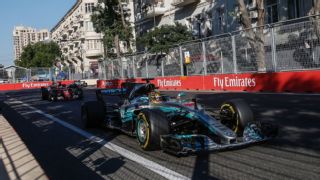 While it cannot be used as justification for what followed, it is worth analysing the initial rear-end collision in order to understand Vettel's actions. Although it wasn't released in an official document after the race, the stewards did look at the first collision and their analysis of the data quickly determined Hamilton's car had "maintained a consistent speed and behaved in the same manner on that occasion as on all other Safety Car restarts during the race". Vettel's assertion that Hamilton had hit the brakes as he exited Turn 15 ahead of the restart was rejected. Watching the onboard footage of the incident from Hamilton's car, his speed through the corner looked slow but it is clear he did not anchor on the brakes. It's only when you see it from Vettel's perspective in the accelerating Ferrari that the speed differential between the two cars is clear. It's normal under the Safety Car for drivers to accelerate out of corners, which is why Vettel was caught out by Hamilton, but according to the rules the lead car is entitled to control the pace on a restart. Erratic accelerating or braking must be avoided, but the traces from Hamilton's pedals showed neither as he cruised through Turn 15. Ultimately, the stewards decided there was no blame to be apportioned for the first collision and instead turned their attention to the events that followed. What was Vettel thinking?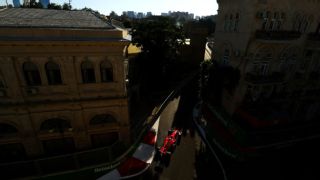 With drivers as talented as the two championship leaders, manoeuvres such as Vettel's don't happen by accident. It is incomprehensible to think a four-time champion was unable to control his car at 60 km/h and at no point after the race did Vettel claim that he was caught out by his Ferrari. So what was going on in the cockpit of car No.5? In a bizarre series of interviews after the race, Vettel looked and sounded lost. "I drove alongside and then we had a little contact," he said. "But I drove alongside mostly to raise my hand. I didn't give him the finger or anything, I just wanted to tell him because I can't literally talk to him and tell him that what he did was not right." That was as good as the explanation got. For the remainder of the interview, every time he was asked about the second collision he reverted to talking about the first -- unwilling, or perhaps simply unable, to justify his actions. A couple more general questions were asked about the race before he was whisked away by his PR, and at no point in the brief six minute interview did he show remorse for what happened. Christian Horner, Vettel's former team principal at Red Bull and -- in terms of neutral members of the paddock -- as good a judge of Vettel's character as you'll find, put it down to a momentary loss in judgement. "He just had a Tourette's moment," Horner said. "Emotions are running high, they are fighting for a world championship and I think it cements the rivalry between the two of them for the rest of the season. "It looked like Sebastian felt that Lewis brake tested him and then it just looked like a red-mist moment to me in which he lost it and took it quite badly, which was only ever going to result in a penalty. It's heat of the moment stuff and a penalty was inevitable." 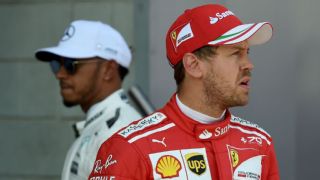 Perhaps the most peculiar aspect of the whole event was Vettel's inability to comprehend that he might have done something wrong. When he was told on team radio that he had been given a penalty for dangerous driving, he calmly replied "When did I do dangerous driving, then?" Even after the race once he had been through the wringer of 20 minutes of TV interviews and spent a period of time in Ferrari's hospitality, he didn't seem to understand why the penalty had been issued. "We are here to race," he told a gaggle of written journalists once the sun had set over the Baku paddock. "We are all here and grown-ups and people expect us to race and use our elbows. That's what people want.Here and there we might get a bit close, but people want real overtaking and not just us driving past. "After that [incident] I had a handful, obviously. I enjoyed the race, but I don't think it's the right thing that I got a penalty and he didn't." What happens next?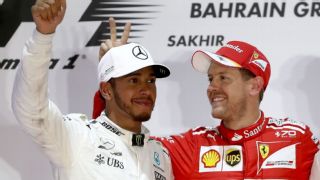 There were suggestions after the race that the FIA may want to take further action against Vettel on the basis of bringing the sport into disrepute. Only eight months ago the Ferrari driver was on thin ice with the governing body following a foul-mouthed rant aimed at race director Charlie Whiting. At the time, the FIA issued a statement that warned all drivers "to be respectful and mindful of the example they set for the public and the younger generation in particular" adding "in the event of any future incident similar to the one that occurred in Mexico, disciplinary action will be taken by bringing such incident before the FIA International Tribunal to be judged." It's true that Vettel's transgressions in Mexico and Baku are completely different in nature, but in terms of setting an example for the public and younger generations Vettel's actions on Sunday were arguably worse. There are many in the paddock that believe Vettel got off lightly with a ten-second penalty and, should it deem fit, it is within the FIA's power to take further action -- as it did when Michael Schumacher was disqualified from the entire 1997 season for crashing into Jacques Villeneuve at that year's season finale. 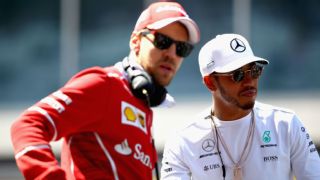 Regardless of whether or not further sanctions are issued, the relationship between Vettel and Hamilton has changed dramatically. At the opening seven rounds of the season the pair shared handshakes, exchanged hugs and cracked jokes following races, but it is hard to believe that level of camaraderie will return at any point in the foreseeable future. Vettel said he plans to talk to Hamilton away from the track to clear the air, but judging by Hamilton's mood on Sunday it will be a very brief conversation -- if it happens at all. "Firstly, he doesn't have my number!" Hamilton said. "For me, I'm just going to do my talking on the track, that's most important for me. I've heard what he said after the race and it seems kind of... I've not come out of the race and pointed the finger or said anything necessarily, it is what it is, it happened. "It happened and I don't think it was right but the biggest thing for me is that I lost the race through the headrest issue. All I'm thinking of is getting my head together and I want to kill it in the last 12 races, I want to win the next 12 races." In terms of this year's championship, the intense rivalry between Ferrari and Mercedes gained a razor sharp edge in Azerbaijan. The respect that clearly existed before lap 19 in Baku is now paper thin, and unlikely to be rebuilt in the heat of a championship battle. As Mercedes boss Toto Wolff said on Sunday evening, "Nobody wants to see schmoozing anyway. Now the gloves are off."
|
